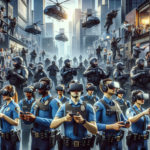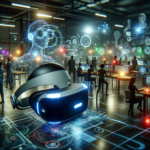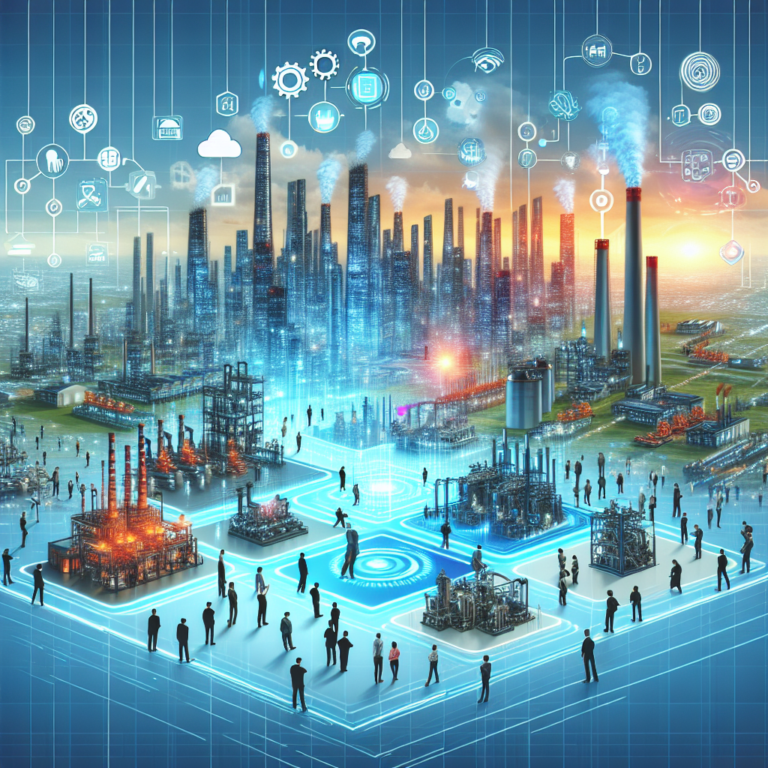Exploring the Industrial Metaverse: Revolutionizing Industries with Virtual and Augmented Reality 🚀
What is the Industrial Metaverse?
The Industrial Metaverse is an innovative and rapidly evolving technology that seamlessly integrates virtual reality (VR) and augmented reality (AR) to create a digital twin of our physical world. Imagine a digital universe where real machines, factories, and even entire cities are mirrored, allowing for enhanced interaction and efficiency. This immersive environment holds immense potential for various industries, marking a paradigm shift in how businesses operate.
Projected Growth of the Industrial Metaverse Market 📈
The industrial metaverse market is on an exponential growth trajectory, with predictions estimating it to become a trillion-dollar industry in the near future. The integration of VR and AR technologies plays a crucial role in enhancing:
- Operational efficiency
- Cost reduction
- Productivity enhancements
Strategically harnessing these technologies can empower companies to streamline their operations, leading to significant financial savings and improved outcomes.
Success Stories: Case Studies of Companies Leading the Charge 💼
Several noteworthy companies have already embraced the potential of the industrial metaverse, showcasing successful integrations of VR and AR technologies:
- Sephora: Utilizes augmented reality for virtual makeup trials, allowing customers to visualize products before purchase.
- IKEA: Implements AR to help customers visualize how furniture will look in their homes.
- Airbus: Leverages digital twins for aircraft design and maintenance, improving safety and efficiency.
- Volkswagen: Engages in virtual training and development, enhancing employee skills in a cost-effective and immersive manner.
These success stories are paving the way for industry-wide adoption, demonstrating the tangible benefits of VR and AR technologies in enhancing productivity and collaboration.
Collaboration Unleashed: The Power of Remote Work 🌐
One of the most transformative aspects of the industrial metaverse is its ability to facilitate enhanced collaboration. With VR and AR, employees can work together from anywhere in the world, breaking down geographical barriers. This global collaboration is revolutionizing engineering processes, particularly in industries like automotive manufacturing. By enabling real-time teamwork and sharing of ideas, the industrial metaverse becomes a tool for innovation.
The Importance of Robust Network Infrastructure 🛠️
For the industrial metaverse to thrive, high-quality network infrastructure is paramount. Technologies such as:
- 5G Mobile Networks: Provide the necessary speed and low latency for real-time data sharing.
- High-Speed Fixed Networks: Facilitate seamless connectivity between devices and systems.
The success of VR and AR technologies hinges largely on the quality of these networks, as they allow for swift data exchanges and immersive experiences critical for the industrial metaverse.
The Role of Big Tech in Advancing the Industrial Metaverse 🏢
While some industries remain hesitant to embrace the industrial metaverse, major technology companies like Apple and Microsoft are making substantial investments in AR technology. Their commitment is crucial, as it paves the way for future applications that could redefine industry standards. The collaboration between big tech and Web3 startups presents exciting opportunities in developing cutting-edge software products that leverage VR and AR technologies.
Technology Underpinnings of the Industrial Metaverse 🔧
The backbone of the industrial metaverse involves several key technologies:
- Digital Twin Technology: Creates virtual replicas of physical entities, enabling remote management and data optimization.
- Blockchain: Ensures secure and transparent interactions in the digital space.
- Artificial Intelligence (AI): Enhances user experiences through machine learning and data analytics.
- Internet of Things (IoT): Connects devices and systems for real-time monitoring and control.
Together, these technologies create a secure, interactive platform poised to transform industries and processes significantly.
Applications Across Diverse Industries 💡
The applications of the industrial metaverse span a wide range of sectors, including:
- Manufacturing: Digital twins optimize operational processes and drive efficiency.
- Logistics: Enhanced supply chain visibility and control through real-time simulations.
- Healthcare: AR and VR applications for training and remote diagnostics.
- Education: Immersive learning experiences through virtual classrooms and simulators.
- Urban Planning: Visualizing smart city frameworks before implementing costly physical changes.
Each sector stands to benefit significantly from the enhanced productivity and collaboration that the industrial metaverse promises.
Addressing Challenges and Future Prospects 🚧
Despite the potential promising future, there are challenges to overcome, such as:
- Data Privacy: Ensuring user data protection in an interconnected world.
- Digital Disparity: Addressing the gap between those with access to cutting-edge technology and those without.
- Workforce Readiness: Preparing employees for the digital transition through skill development and training.
Governments and institutions must prioritize legislation to address these concerns, focusing on digital inclusivity, data privacy, and education in digital skills. These steps are critical to ensuring a successful transition to a digitally powered future.
Convergence with the Spatial Web 🌍
The rise of the spatial web (or Web 3.0) promises to innovate how we connect digital content with physical objects, creating unprecedented interaction possibilities. The anticipated market for spatial computing could surpass US$600 billion by 2032, indicating immense opportunities for businesses willing to adopt spatial operations. This convergence between the industrial metaverse and spatial computing will redefine workflows, focusing on enhanced experiences and operational improvements.
The Future of Work in the Industrial Metaverse 🛠️
As we peep into the future, it’s clear that the industrial metaverse is set to reshape the way we work, innovate, and create. From enhancing employee training to facilitating collaboration on a global scale, the potential for operational efficiencies is boundless. As businesses embrace these changes, adoption of the industrial metaverse could very well be the key to unlocking a new era of industry transformation.




0 Comments